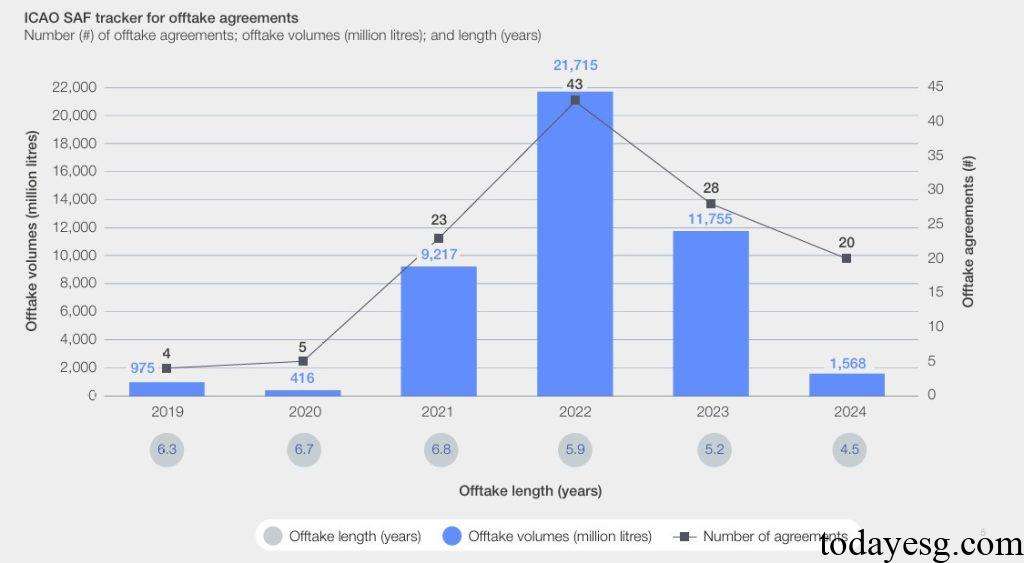Report on Sustainable Aviation Outlook
The World Economic Forum (WEF) releases a report on Sustainable Aviation Outlook, aimed at summarizing global sustainable aviation development and providing guidance for decarbonization in the aviation industry.
The International Civil Aviation Organization plans to reduce carbon emissions from aviation fuel by 5% over the next five years and achieve net zero emissions from international aviation by 2050.
Related Post: International Maritime Organization Releases Greenhouse Gas Reduction Strategy
Sustainable Aviation Survey
The World Economic Forum conducts a survey of 30 aviation industry executives worldwide to understand their attitudes towards sustainable aviation development. More than two-thirds of the respondents believe that decarbonization in the aviation industry will continue, with the development of sustainable aviation fuel being the main driving factor. The global production of sustainable aviation fuel has doubled in the past two years and is expected to continue doubling this year. The European Union, the United Kingdom, and other jurisdictions have developed roadmaps for the application of sustainable aviation fuel.
More than 70% of respondents are optimistic about the decarbonization targets set by the International Civil Aviation Organization for 2030. The COP29 conference held many activities related to the aviation industry, clarifying the rules for the application of carbon credits in the aviation industry to avoid double counting in Nationally Determined Contributions. Some respondents believe that jurisdictions can add mid-term targets on top of the 2030 and 2050 goals to measure carbon reduction effectiveness.
Sustainable Risks in Aviation Industry
Respondents rank the risks facing decarbonization in the aviation industry and identify the following three types of sustainable risks:
Technical risk
- Availability and cost of SAF: Ranks first. The price and availability of fuel are the most concerning factors for respondents, and since 2022, the number of fuel related agreements has been decreasing. Due to limited current fuel production technology, although future production continues to increase, fuel costs will put pressure on operations in the short term.
- Availability and cost of green electricity, hydrogen and infrastructure: Ranks sixth. Green hydrogen energy is an important factor in decarbonizing aviation, a raw material for sustainable aviation fuel, and may provide power for infrastructure. The respondents believe that the uncertainty of regulatory policies may lead to lower-than-expected levels of hydrogen production, and the cost-effectiveness of deploying hydrogen energy still needs to be considered.
- Availability of hydrogen and battery-electric aircraft: Ranks seventh. Zero carbon aircraft powered by hydrogen energy are currently under development, but many aircraft manufacturers have encountered difficulties in funding preparation and technological research, which has slowed down the pace of this research.
- Availability of carbon dioxide removals and out-of-sector carbon offsets: Ranks tenth. Carbon removal and carbon offset technologies compete with sustainable aviation fuels, and the cost of dealing with additional carbon emissions is usually higher than the cost of reducing carbon emissions at the source.

Policy risk
- Alignment of SAF policy across regions and longevity of subsidies: Ranks second. Multiple jurisdictions around the world have developed sustainable aviation fuel policies, but there are differences in their standards and goals. Insufficient supply of raw materials in the short term may result in some jurisdictions being unable to achieve their goals.
- Implementation of CORSIA and Effectiveness of carbon pricing and emissions trading schemes: Ranks third and fifth. 129 jurisdictions have joined the carbon offset plan, but airlines have limited ability to purchase carbon credits and are also required to comply with the carbon offset plan and local carbon emission trading system, which may slow down the implementation of the plan.
- Geographical concentration of resources: Ranks eighth. The production of sustainable aviation fuel is highly dependent on biological raw materials, and developed economies typically import raw materials from developing economies. These trade activities may be influenced by factors such as policies and markets.
Sustainable risk
- Traceability of sustainability criteria for SAF feedstocks: Ranks fourth. The raw material audit for sustainable aviation fuel will continue to strengthen, and the cost of using biological raw materials will increase, leading to an increase in fuel costs.
- Greenwashing and consumer skepticism: Ranks ninth. Some jurisdictions believe that the use and promotion of sustainable aviation fuels may lead to greenwashing.
Reference:





